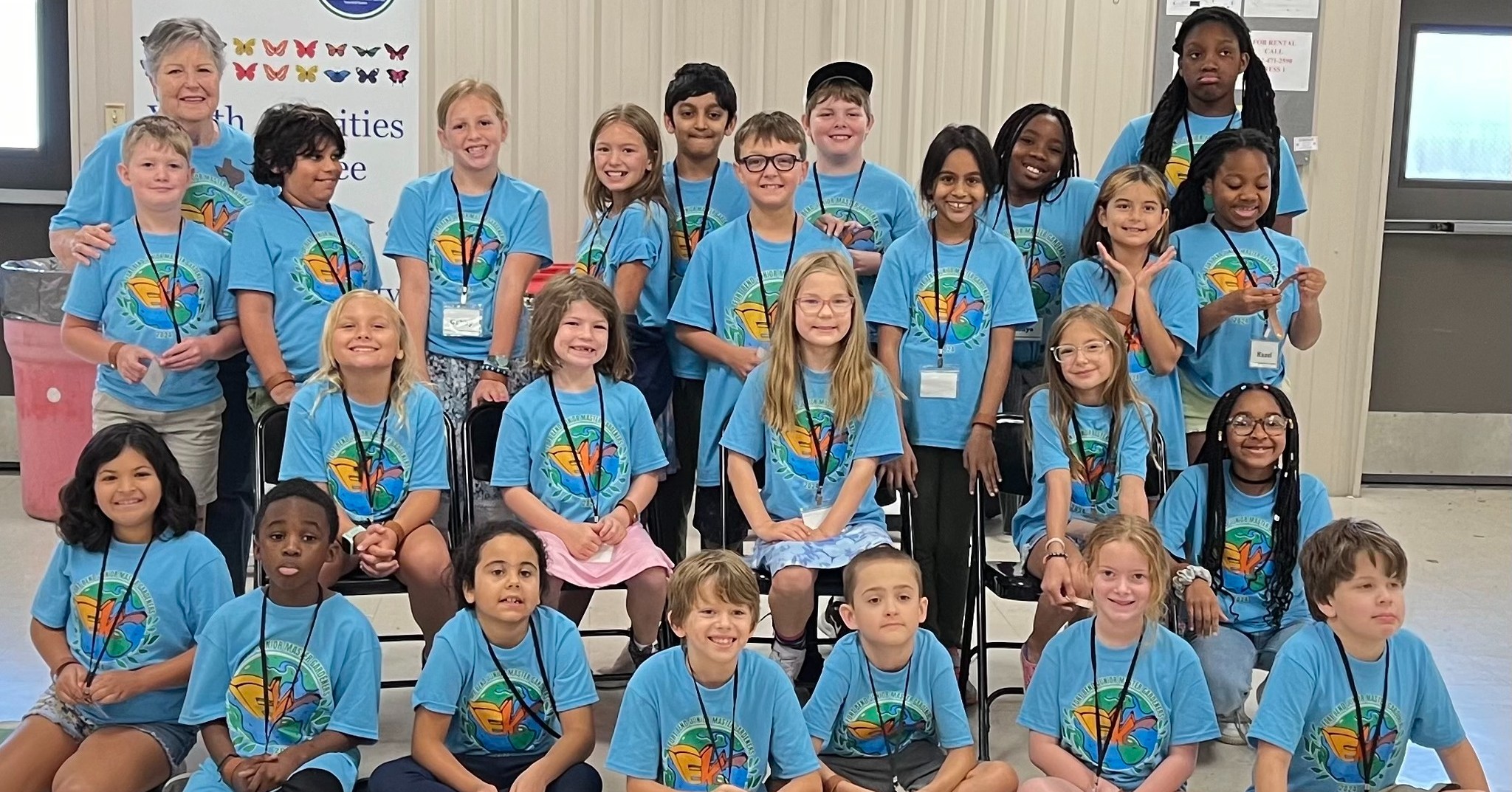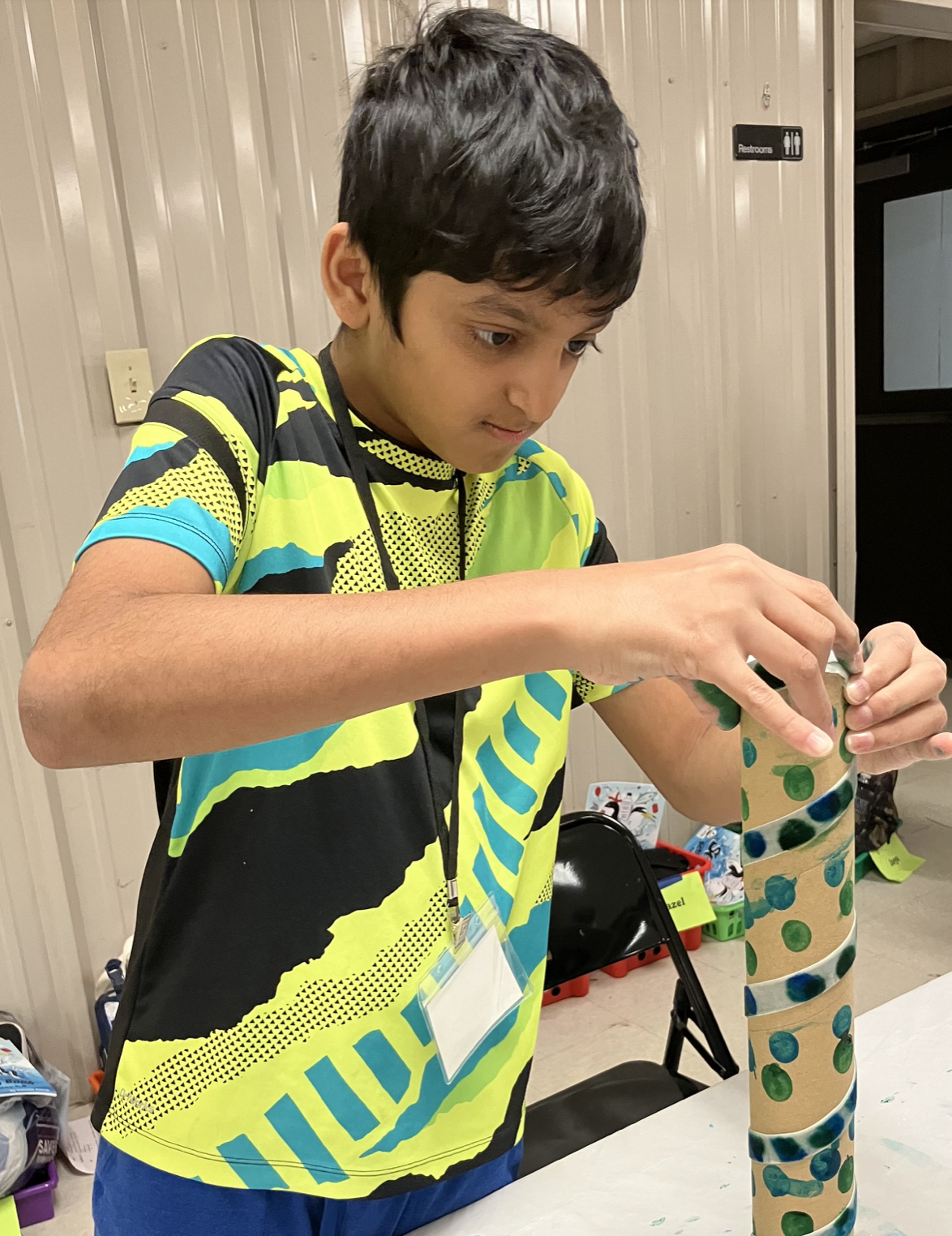
Fort Bend County Master Gardener's Summer Camp Nurtures Young Gardeners
By Fort Bend County Master Gardeners
A four-day summer camp introduced elementary-age students to horticulture, gardening and the environment in an atmosphere that fostered friendships and fun while they learned.
The 14th annual EarthKind Kids Camp at the Fort Bend County Fairgrounds, July 22-25, was a hands-on experience organized and managed by the Youth Activities Committee of the Fort Bend County Master Gardeners that allowed campers to make paper mache infused with seeds, toad abodes and rain sticks while learning about Zen gardens, parts of a plant and medicinal plants. But it's the fun atmosphere that participants single out first.
Alex, 9, and Corbyn, 10, were among the 24 young campers - pupils entering third through fifth grade. Fourth-grader Alex said this was his second year at camp. "I like camp because we get to do fun activities," he said. "We get to make new friends. We made a frog house and a Zen garden. I like coming here. It's really fun."
Fifth-grader Corbyn agreed. "We get to make new friends that we've never met." This was Corbyn's third year to attend the summer camp.
"We get to learn about the environment and helping the environment," added Corbyn. "So, we can help clean up the earth."
Creating a cleaner environment was one aspect of Wednesday's program which focused on water, and which featured for the first time a program by SPLASh (Stopping Plastics and Litter Along Shorelines).
Mobile Sidebar Ad
During one of four hands-on SPLASh activities, Alex was tested to look in a tray for food as a bird might without including microplastics. His hunt occurred under the supervision of Master Gardener Clarence Gray of Missouri City. Microplastics are the size of a grain of rice or the tip of a pencil eraser, according to SPLASh, and they can be mistaken for food or are accidentally eaten by wildlife. "Seabirds ingest more plastics than any other animal," according to SPLASh, which was represented by Chloe Dannenfelser of the American Bird Conservancy and Celeste Silling of the Gulf Coast Bird Observatory. Seeing the impact that trash pollution has on birds and other wildlife, the Conservancy partnered with the Observatory and Black Cat GIS to form SPLASh in 2020.
Each camper received a SPLASh activity book to take home.
Each youth also received a bag from the North Fort Bend Water Authority that included a water meter, a hose sprayer and other water-related items, said Master Gardener Donna Blackburn of Sugar Land who also is FBMG Youth Activities Director and has worked on the YAC camp since 2013.
"Camp gives us an opportunity to reach out to children about horticulture and environmental sciences and they seem to learn a lot from it," said Blackburn. "Instructors are very knowledgeable in what they're sharing with the kids. There's always a follow-up activity to re-enforce what we talk about."
She said it's not unusual for a youngster to attend more than one year of camp, either. "We get a lot of repeats." Five of this year's campers participated in earlier camps. Several students wanted to return to camp but aged out and couldn't participate this year, she added.
Another first-time activity for campers came from JMG Advance Trained Master Gardener Lynn Lucas of Fulshear who provided materials for them to create and decorate rain sticks from thick cardboard cylinders lined with metal screening and then filled with stones. When the sticks are turned, they make a noise similar to falling rain.
 Jaideep decorates his rain stick. (Photo: Fort Bend County Master Gardeners)
Jaideep decorates his rain stick. (Photo: Fort Bend County Master Gardeners)"One thing man always wanted to do was to figure out a way to make it rain," she said, talking of how humans did rain dances with gourds and rain sticks and dumped dry ice in moisture-filled clouds to produce rain.
Lucas went back thousands of years to talk of humans and their relationship with water from following animals, to locating near streams/lakes, digging tunnels and using terracotta pots for subterranean irrigation. Wells have served as water sources and sprinklers and irrigation systems have been used to meet water needs. She stressed the importance of people needing to use their water sources well and not waste the resource. "We have to have water in order to have plants. Without plants there's no life here."
Her presentation prompted comments from 10-year-old Jaideep about water conservation. He later said he has studied water and water conservation.
Jaideep's comments about conservation are not unusual, Blackburn noted. Students are asked what they have to share after camp presentations, she said, and the hands go up; there's a lot of participation.
Incoming fifth-grader Jayda attached flowers to her rain stick. This was her first year at camp. "I like doing the arts and crafts. I learned about parts of the flower and different butterflies. It's been fun and I've learned a lot."
There's a lot of participation by Master Gardeners, too. Master Gardener Jean Trevino of Sugar Land is a longtime camper. "I love playing with kids," said Trevino, who also chairs the Master Gardeners vegetable garden. At camp, she helped campers make hats for their parade on the last day and worked with Master Gardener Karen McCoy of Wallis on a Three Sisters garden project, which involves corn, green beans and squash. Explained Trevino: "You grow corn. Corn is tall. You plant green beans at the bottom to add nitrogen to the soil. You plant squash and the squash will climb up the corn stalk. They will all work together to create a nice crop."
The Youth Activities Committee volunteers from the Fort Bend County Master Gardeners start working on plans for the camp in January. They report that they have as much fun as the campers.


